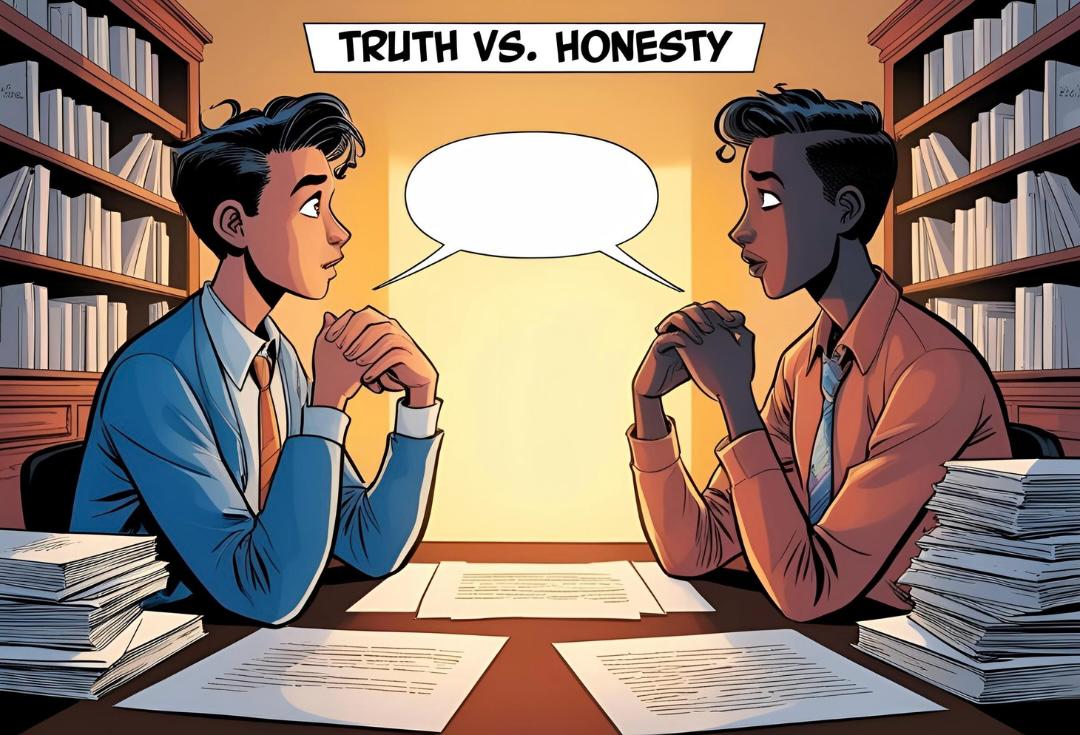Finding Balance in Personal Relationships

Navigating honesty in personal relationships is complex. The concepts of being truthful and being transparent often intertwine, but understanding the difference can help us make more mindful decisions in our interactions. While truthfulness involves accuracy and honesty, transparency goes a step further, involving proactive sharing of information. Both approaches can strengthen relationships, but they serve different purposes and can be powerful in distinct ways.
This post explores how we can integrate truthfulness and transparency in our relationships, backed by psychological insights, to build trust and connection while respecting boundaries.
Defining Truthfulness and Transparency in Relationships
Truthfulness is about responding to questions or situations with honesty and accuracy, answering openly without altering facts. For instance, if a partner asks, “Did you feel hurt by what I said?” a truthful answer would address that question directly—“Yes, I felt a little hurt”—without exaggerating or hiding the feeling.
Transparency, in contrast, involves willingly sharing information that might be significant, even if it hasn’t been directly requested. Transparency means opening up about our thoughts, feelings, and experiences that could impact the relationship. In the example above, being transparent would go further, explaining why the comment hurt, without needing to be asked: “Yes, I felt hurt, and here’s why that comment affected me. I’d love for us to talk about it so we both understand each other better.”
In short, truthfulness is about answering directly and accurately, while transparency is about proactively sharing meaningful information.
Why Both Truthfulness and Transparency Matter in Personal Relationships
Relationships thrive on trust, and both truthfulness and transparency contribute to that foundation in different ways:
- Building Trust: Honesty is the bedrock of trust. Studies show that consistent truthfulness strengthens the perception of reliability in relationships. When we can count on our partner to answer honestly, trust becomes easier to build (Gottman & Silver, 1999).
- Creating Emotional Intimacy: Transparency allows for deeper connection by inviting each person to understand and share in each other’s internal experiences. Self-disclosure—especially sharing emotions, fears, and hopes—leads to stronger emotional bonds and greater relationship satisfaction (Reis & Shaver, 1988).
- Avoiding Assumptions and Misunderstandings: In many relationships, tension arises not from dishonesty but from a lack of clarity. Being transparent helps prevent misunderstandings by clarifying thoughts and intentions. For instance, sharing the backstory of why we feel a certain way can reduce the likelihood of our partner misinterpreting our emotions.
Examples: How Truthfulness and Transparency Play Out in Real Life
Scenario 1: Discussing Past Experiences
Imagine your partner asks if you’ve ever felt nervous about commitment. Being truthful, you might simply say, “Yes, I have felt nervous about it before.”
Transparency, however, would involve elaborating, perhaps by saying, “Yes, I’ve had those fears, especially after a previous relationship where things didn’t work out. I’m committed to us, but I want to work through any remaining fears together if that’s okay with you.” Here, transparency opens up a dialogue for deeper understanding and mutual support.
Scenario 2: Handling Personal Challenges
Let’s say you’re feeling stressed at work, which has impacted your mood at home. Truthfulness could mean telling your partner, “Work has been really overwhelming this week.”
Being transparent, though, might include saying, “Work has been overwhelming, and I realize I’ve been more distant at home. I’m sorry, and I want you to know it’s not about you. I’m working on managing my stress better.” This level of sharing allows your partner to feel reassured and to offer support, preventing assumptions that your behavior might be due to an issue within the relationship.
Scenario 3: Expressing Feelings of Insecurity
If feelings of insecurity or jealousy arise, being truthful might involve saying, “I felt a little jealous when you were talking with your friend.”
Transparency would mean expressing your underlying feelings and needs: “I felt a bit jealous when you were talking with your friend. It’s not that I don’t trust you—I think it just triggered some of my insecurities. I want us to work together on this, if that’s okay.” This openness allows your partner to understand and respond to your needs while addressing any insecurities in a compassionate way.

“Being truthful is about stating the facts; being honest is about living your values.”
Balancing Truthfulness and Transparency: When to Use Each
While both are important, knowing when to use truthfulness versus transparency can protect emotional boundaries:
- Truthfulness for Privacy and Boundaries: Truthfulness is often enough when discussing topics that don’t directly impact the relationship. Being too transparent about every thought or feeling could lead to oversharing, which may overwhelm the other person. It’s okay to maintain some boundaries and keep certain things private while still being honest.
- Transparency for Significant Topics: When emotions, actions, or decisions may affect your partner, transparency fosters a deeper connection. Being transparent about emotions or experiences that impact the relationship can prevent misunderstandings and foster open communication.
- Recognizing Context and Timing: Transparency is beneficial, but timing matters. Studies on relationship satisfaction highlight that timing and mutual readiness are crucial when sharing vulnerable thoughts (Laurenceau, Barrett, & Pietromonaco, 1998). For instance, it might be better to wait for a calm moment rather than bringing up sensitive topics in the middle of an argument.
Benefits of Embracing Both Truthfulness and Transparency
Embracing both approaches can enhance your relationship by fostering honesty and depth while respecting each partner’s comfort levels:
- Enhanced Trust: By consistently being truthful, your partner can rely on your honesty, which builds trust over time. Adding transparency helps them understand your motivations, reinforcing that trust by showing that you’re open and willing to share.
- Deeper Emotional Connection: Transparency in sharing your internal experiences—your fears, dreams, and challenges—can enhance intimacy, as it invites your partner to see a more vulnerable side of you.
- Reduced Conflict: Transparency, in particular, can help reduce potential conflicts. By clarifying your thoughts and emotions, you minimize the likelihood of misunderstandings, which are often the root of relationship disputes.
In personal relationships, navigating between truthfulness and transparency helps us build authentic connections. Truthfulness enables us to uphold honesty without oversharing, while transparency deepens emotional intimacy by allowing our partner to understand the “why” behind our words and actions.
Remember, finding a balance between the two is essential. Sharing too much without context can be overwhelming, while withholding emotions that impact the relationship may create distance. In practice, consider each situation, decide whether truthfulness alone is enough, or if transparency is needed to support your relationship’s growth.
In the end, being mindful of both honesty and openness in communication brings us closer to the people we care about. By building a foundation of trust, understanding, and mutual support, we allow our relationships to flourish in meaningful ways.



